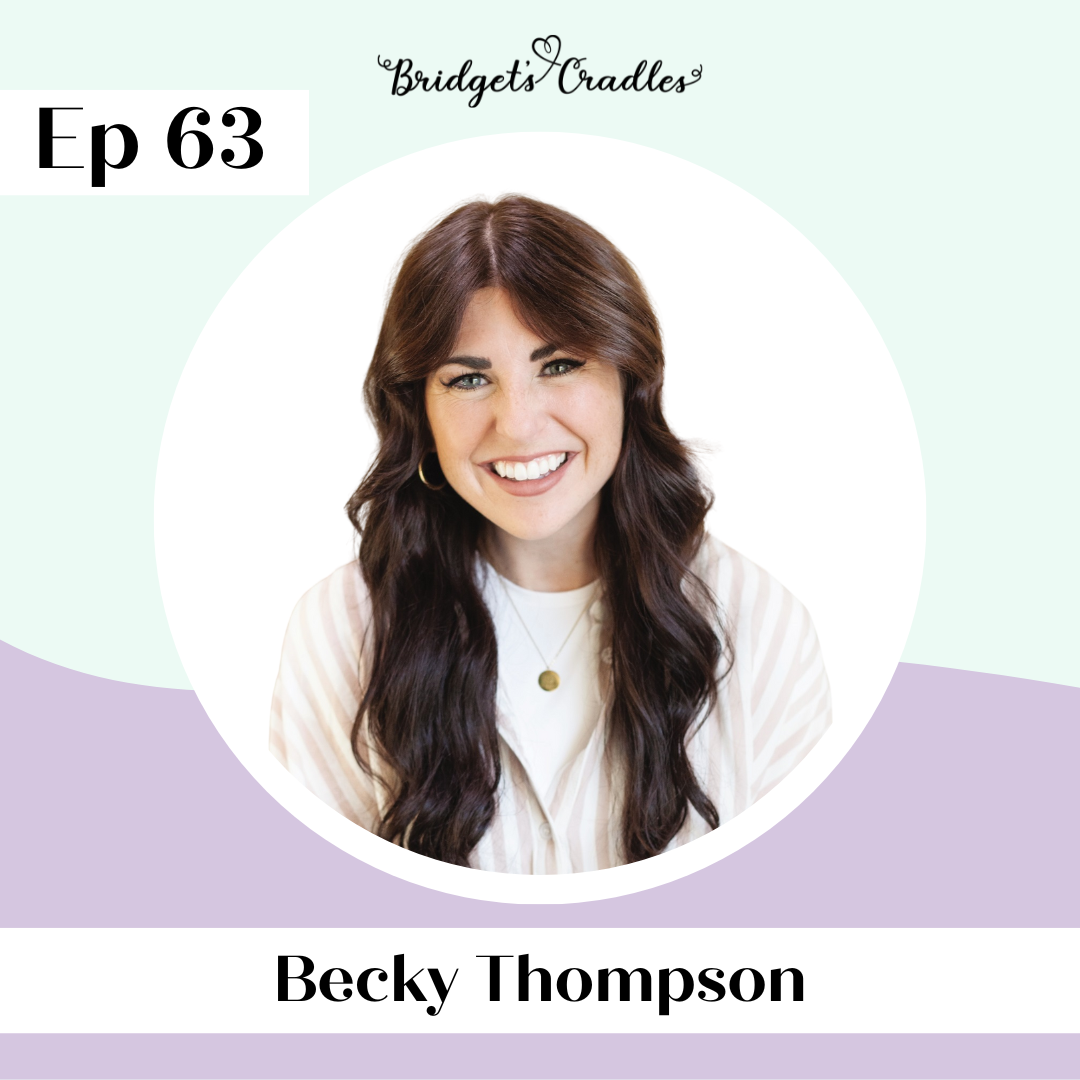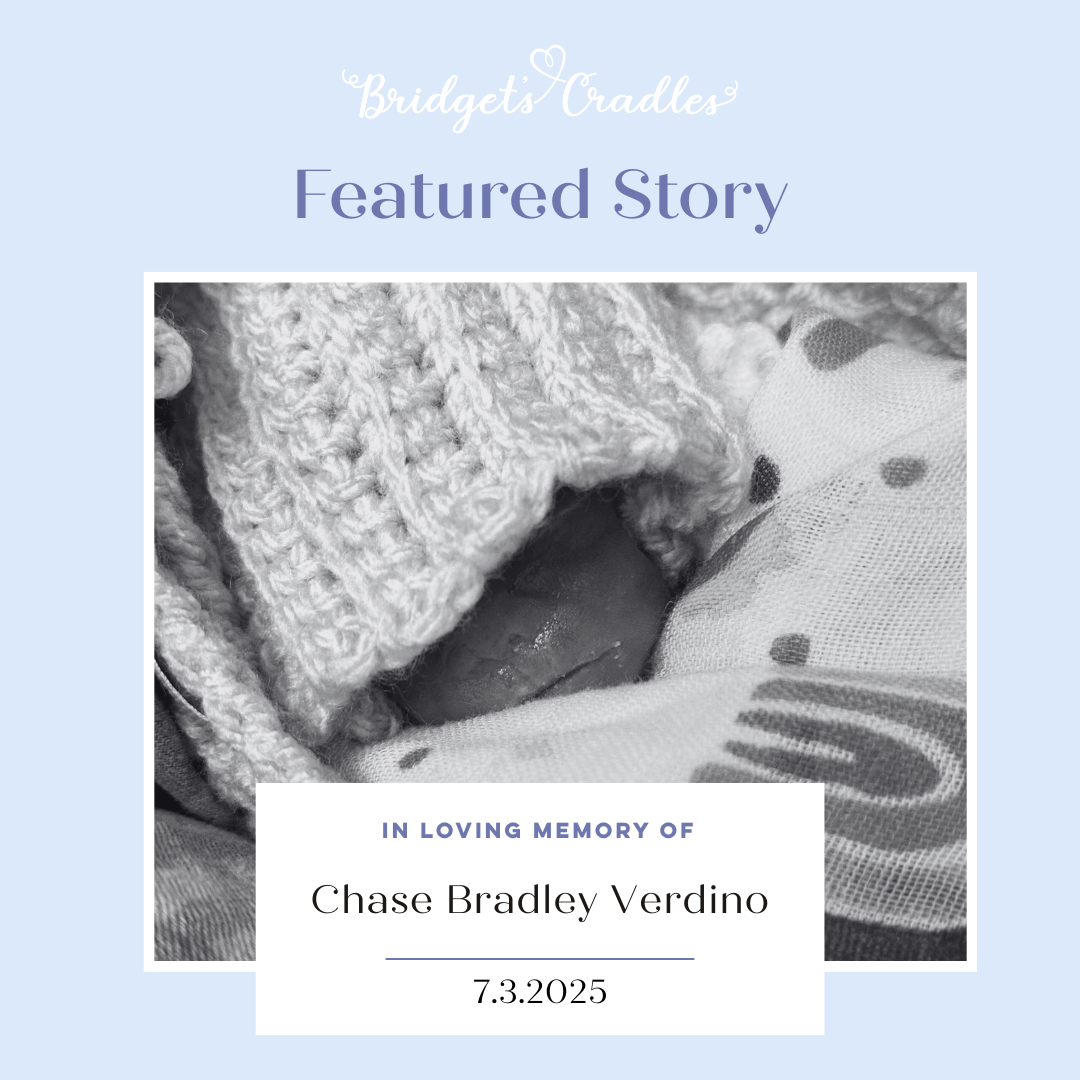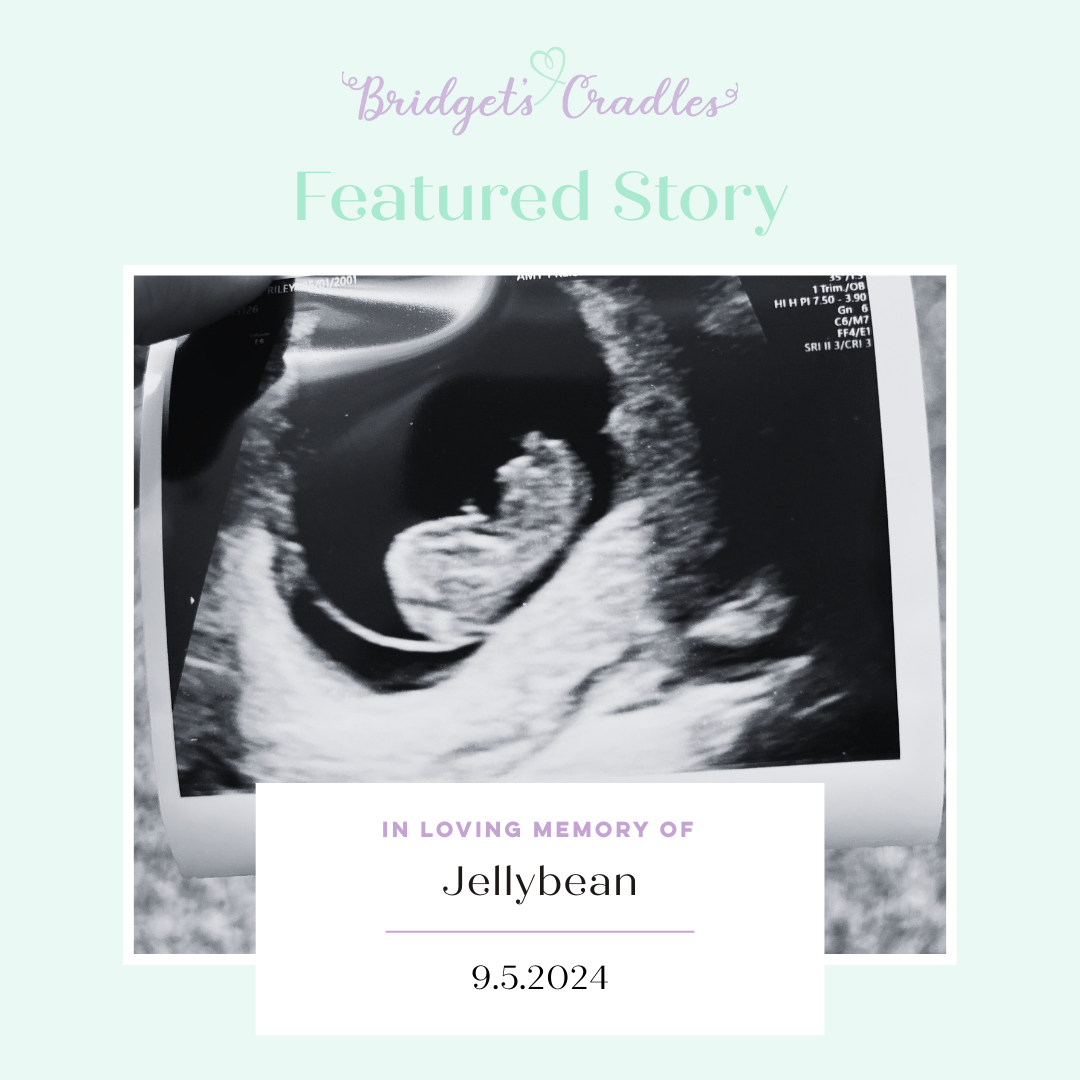Wave of Light | October 15, 2025 Register Now
registration open!
18 | Strengthening Your Marriage after Pregnancy Loss | Matt + Ashley Opliger
February 15, 2022
filed under
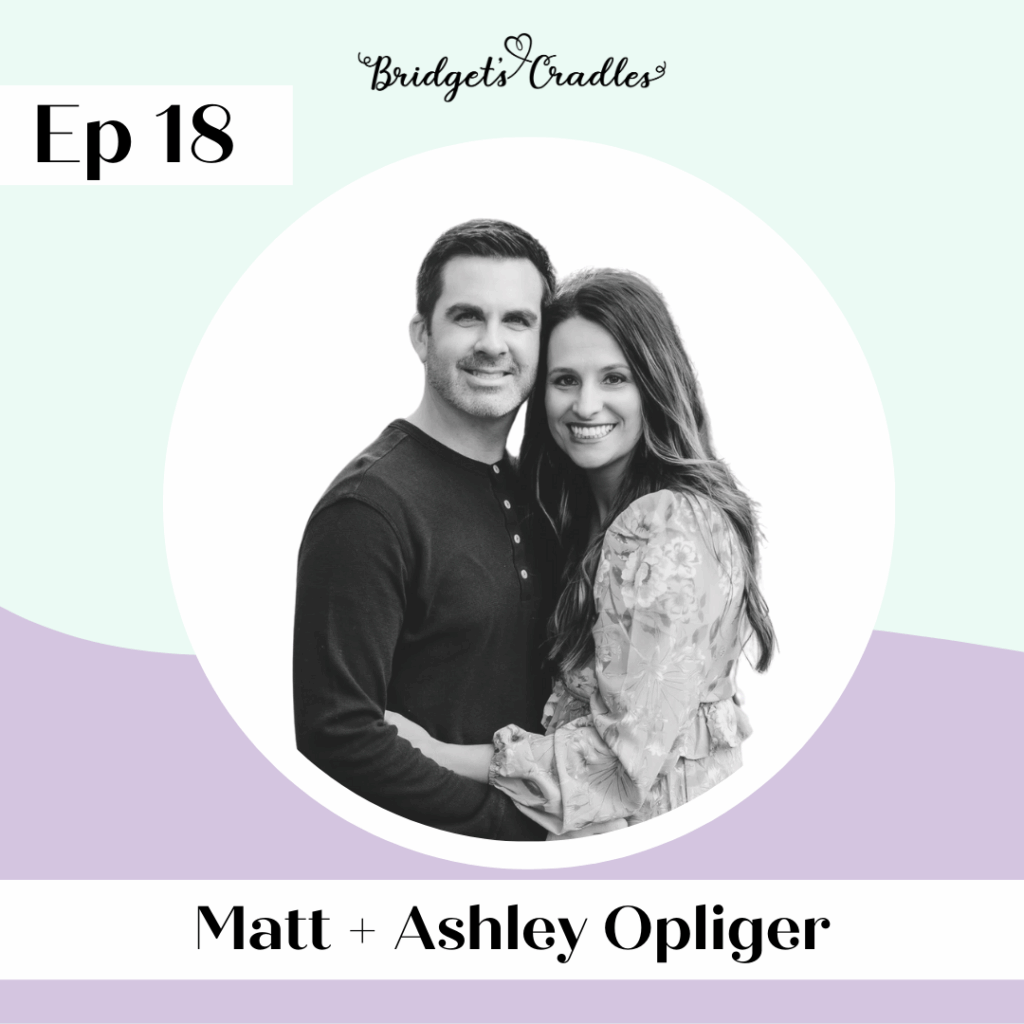
In this episode, Ashley Opliger is joined with her husband, Matt, for a conversation about strengthening your marriage after pregnancy loss. Together, they discuss the struggles they faced in navigating complications in Ashley’s pregnancy with Bridget and how they walked together after her death. Matt shares his perspective, as the father and husband, of what grieving has been like for him.
The loss of a baby is one of the most heartbreaking experiences a couple can face in their marriage. However, even in the pain and sadness, there are opportunities to grow closer together. Matt and Ashley’s prayer for couples is that they would draw near to God and learn to love and support each other through their grief.
In this episode, Matt and Ashley discussed:
Personality differences and struggles with different perspectives
How men and women grieve differently
Supporting each other in the way we grieve
How Matt bonded with Bridget and what his grief has looked like
The importance of communication and grace in marriage
Using a Marriage Journal to make communication intentional
Questions you can ask your spouse to support them in grief
How the 5 Love Languages helped us love each other better
Why Heaven has given us so much hope
Finding meaning in your baby’s life
The impact Bridget has made on our parenting with our boys
Advice for grieving couples from what they’ve learned
Full transcript below.
MEET OUR GUEST
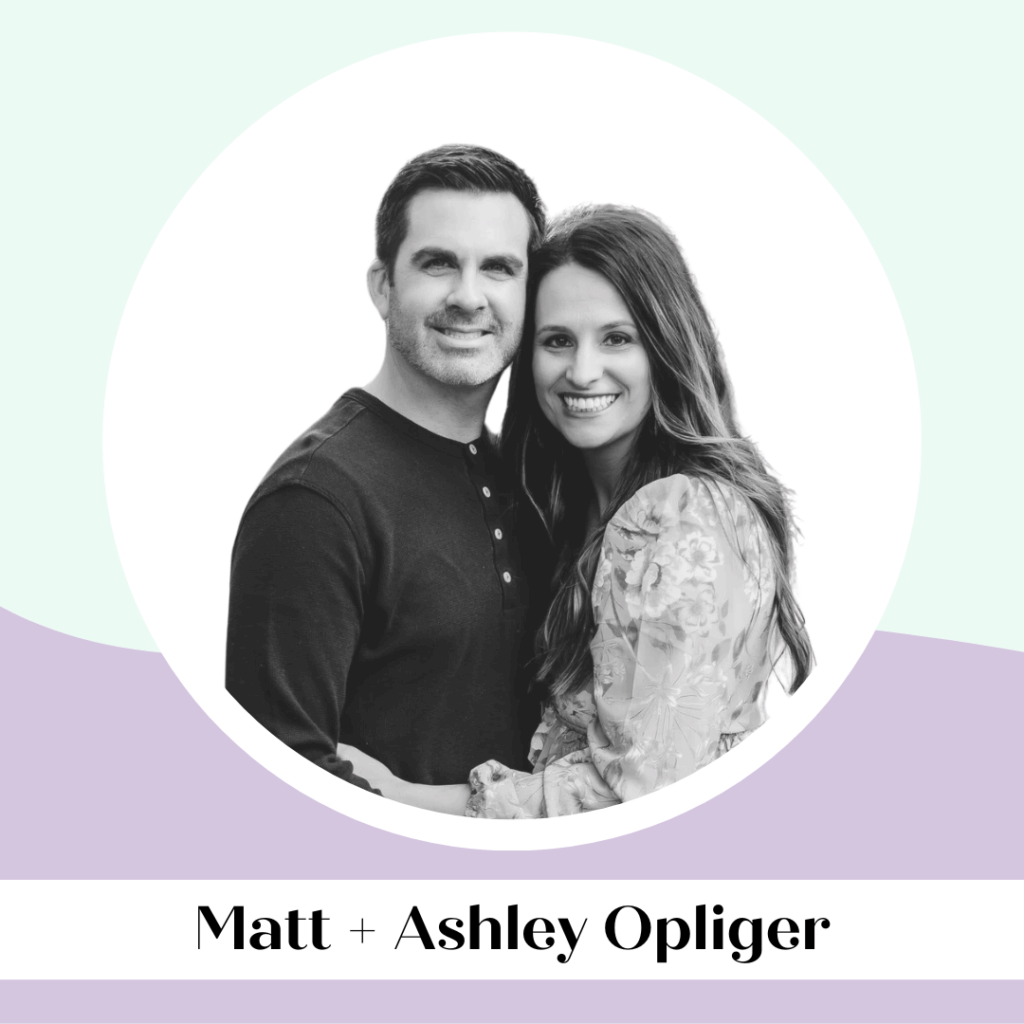
Matt Opliger is married to Ashley and together they have three children: Bridget in Heaven and two sons on earth.
He is the Vice President of Bridget’s Cradles and serves on its Board of Directors. He has a compassion for grieving families and strives to use his time and talents to comfort others through his role in the ministry.
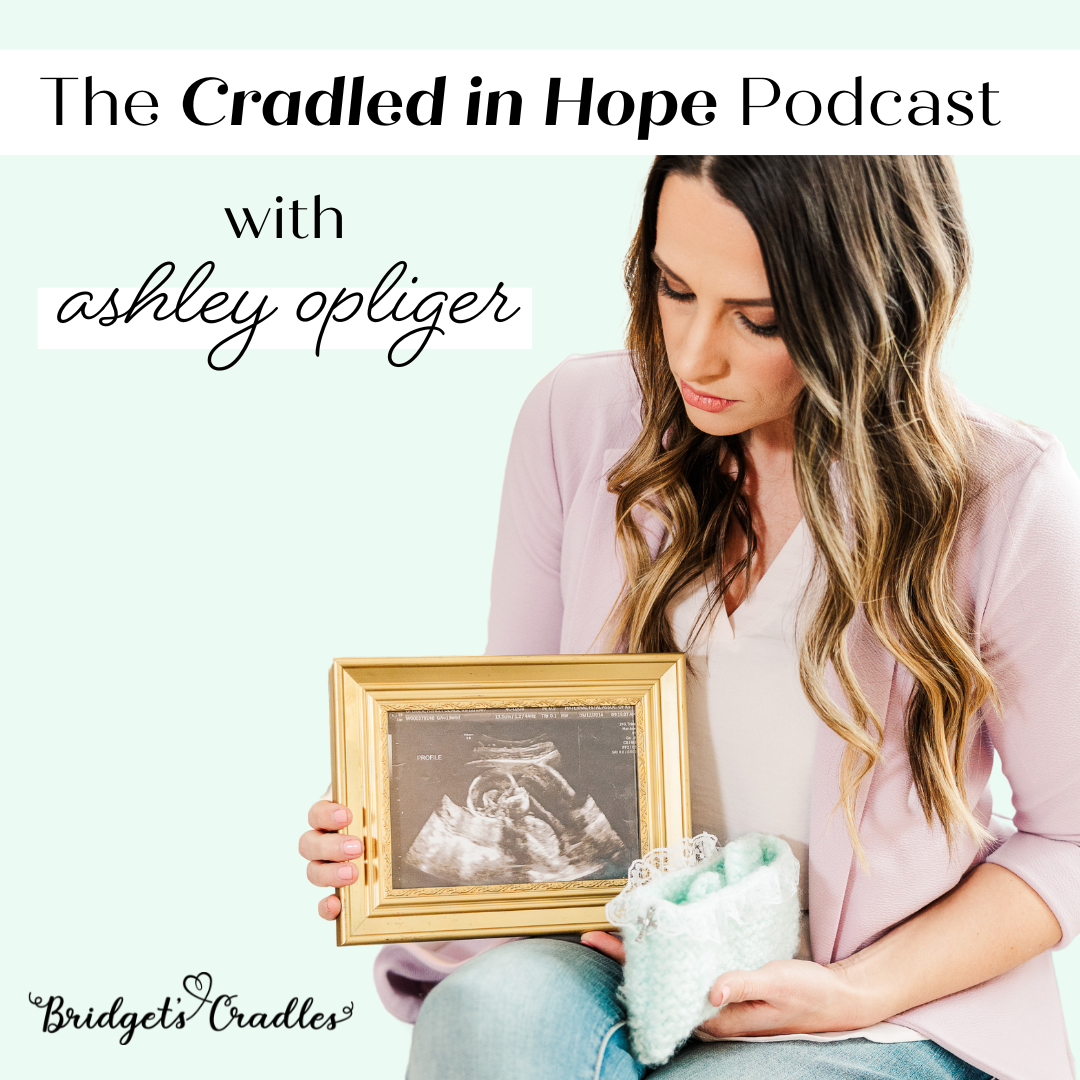
New episodes will be shared on the 1st of every month. Don’t miss a single episode…subscribe wherever you podcast!
Please also leave a review to help spread the message of hope with other grieving mommas!
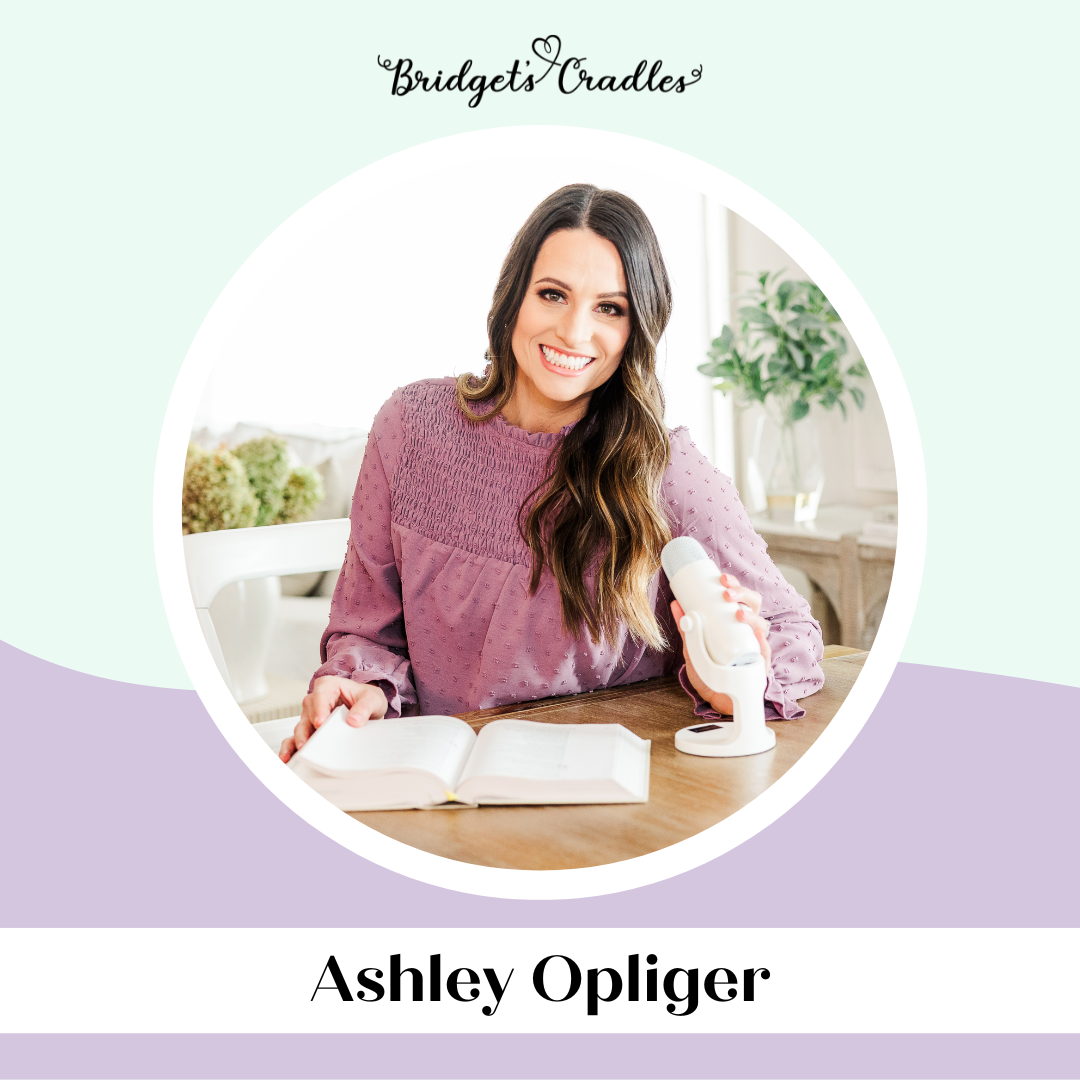
MEET OUR HOST
Ashley Opliger is the Executive Director of Bridget’s Cradles, a nonprofit organization based in Wichita, Kansas that donates cradles to over 1,600 hospitals in all 50 states and comforts over 30,000 bereaved families a year.
Ashley is married to Matt and they have three children: Bridget (in Heaven), and two sons. She is a follower of Christ who desires to share the hope of Heaven with families grieving the loss of a baby.
Connect with Ashley:
Facebook /ashleyopliger
Instagram @ashleyopliger
Pinterest /ashleyopliger
www.ashleyopliger.com
Follow Bridget’s Cradles:
Facebook /bridgetscradles
Instagram @bridgetscradles
Pinterest /bridgetscradles
www.bridgetscradles.com
JOIN OUR CRADLED IN HOPE COMMUNITY FOR GRIEVING MOMS
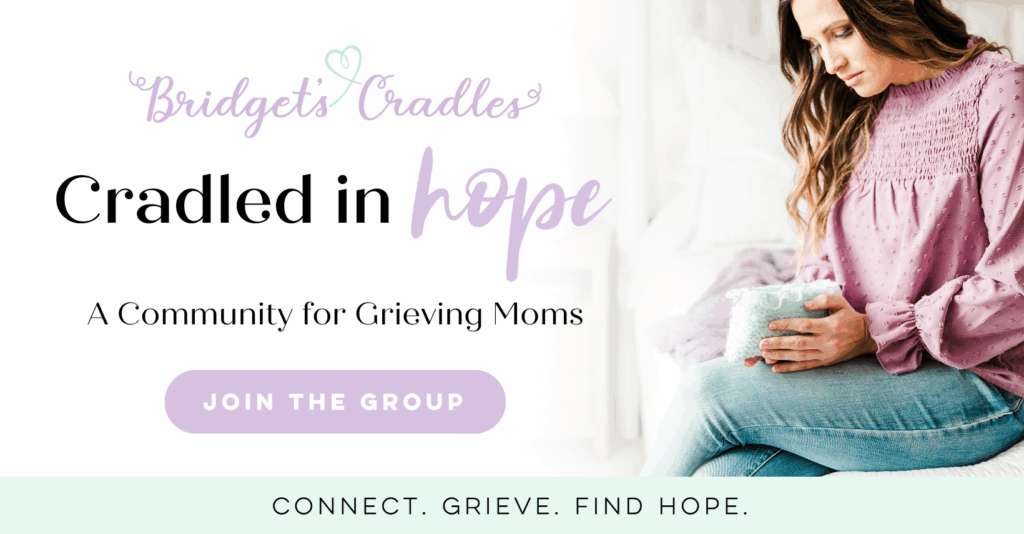
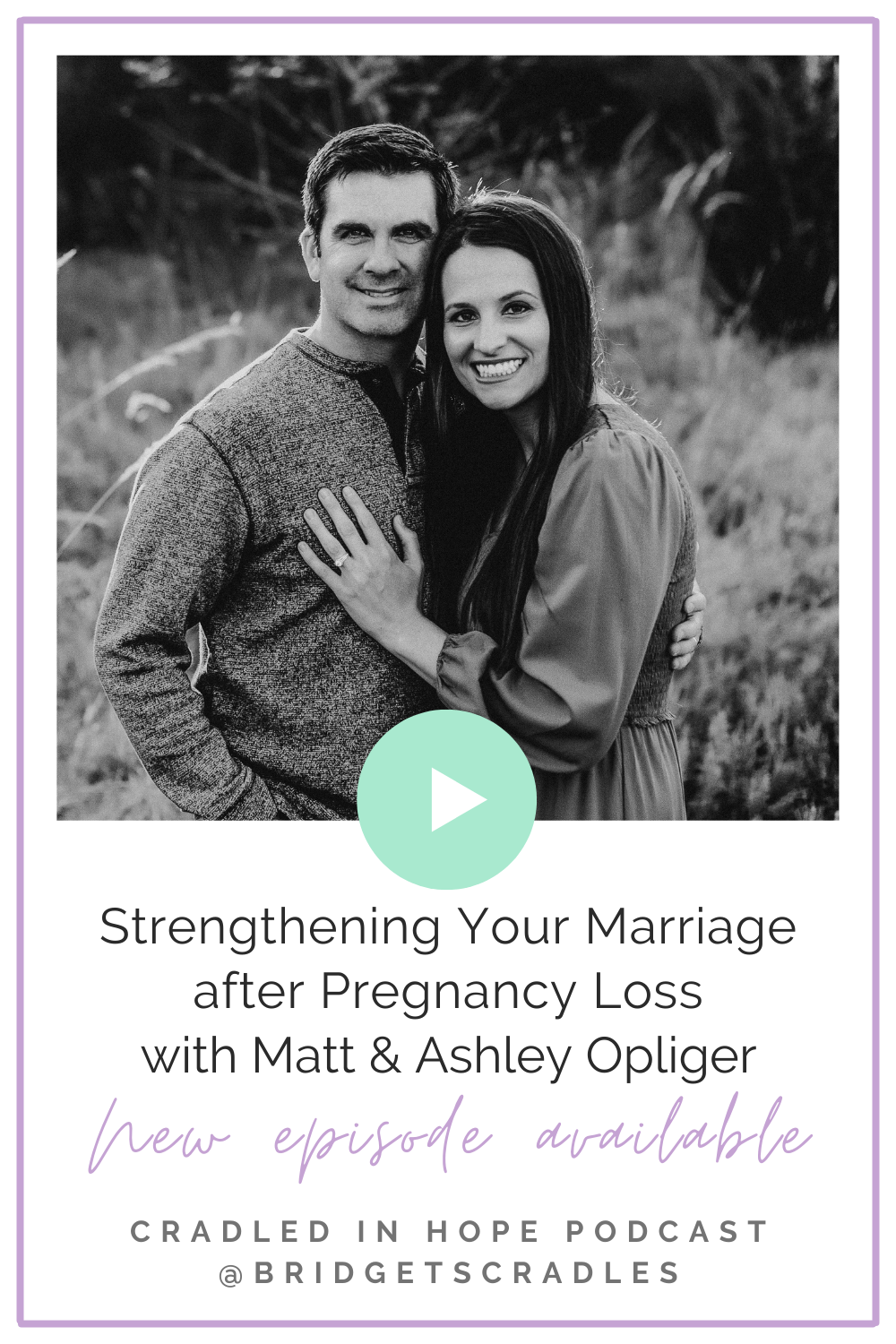
EPISODE TRANSCRIPT
Episode 18: Strengthening Your Marriage after Pregnancy Loss
with Matt & Ashley Opliger
Ashley Opliger: [00:00:00] You’re listening to the Cradled in Hope Podcast where we believe that the hope of Heaven, through faith in Jesus Christ, has the power to heal our hearts after the loss of a baby. It’s a pain no mother should have to endure and we want this podcast to be a safe place for your broken heart to land. Here, we are going to trust God’s promise to restore our joy, use our grief for good, and allow us to spend eternity with our babies in Heaven.
I’m your host, Ashley Opliger. I’m a wife, mom, and follower of Christ clinging to the hope of Heaven. My daughter, Bridget, was stillborn at 24 weeks in my first pregnancy in 2014. In her memory, my husband and I started a nonprofit ministry called Bridget’s Cradles, and God has given us purpose in our pain and we’ve seen beauty come from ashes.
Although we wish you didn’t have a need to be listening to this podcast, we believe God has a reason for you to be here today. We pray this time would be a source of healing for you as we remember that Jesus cradles us in hope while He cradles our babies in Heaven. Though we may grieve, we do not grieve without hope. Welcome to the Cradled in Hope Podcast.
Ashley Opliger: [00:01:26] Welcome, and I hope you all had a wonderful Valentine’s Day. This month, we wanted to have our focus in our podcast be for couples grieving together, and strengthening your marriage through loss. So Matt and I recorded this episode to share our story and talk about the challenges of grieving differently and how we worked through that to support and love each other through our grief.
I’m so grateful that he was willing to come on and share his perspective as the husband and Bridget’s Dad. I do think this episode would be a good one to listen to with your spouse or to forward along to your spouse so that he can listen to it on his own. It hopefully will open up communication and allow you to talk through the episode and topics together.
This month, we also had a support group for couples online, and we’re about to have an in-person one for couples at our headquarters in Kansas. If you’re not able to find a couples’ support group where you live, or even if you do find one to attend, we do strongly recommend couples’ marital counseling to walk through grief together.
It is not a sign of weakness, but of strength to get professional Christian counseling. Matt and I have gone to counseling and have found it incredibly helpful. Our ultimate prayer for you is that walking through this pain and the sorrow of losing a child would be an opportunity for you to lean on each other and be able to strengthen your marriage. So let’s jump into this conversation with my husband, Matt.
Ashley Opliger: [00:02:53] Hey, welcome to the podcast.
Matt Opliger: [00:02:55] Hey, I’m glad to be here with you.
Ashley Opliger: [00:02:57] So, Matt, would you mind introducing yourself for everyone?
Matt Opliger: [00:03:01] Sure, yeah. I’m Matt, husband, father of three, and we’ve been married for seven years now and have three great kids; obviously Bridget, which is why we started this organization, and then Branton and Brenner.
And I won’t get too much into the engineering because I know that’s pretty boring probably for most of the listeners, but yeah, I’m an engineer and do a lot of nerdy stuff and research materials and testing.
Ashley Opliger: [00:03:25] What kind of engineer are you?
Matt Opliger: [00:03:26] I’m an aerospace engineer, and so I work with materials that are primarily used in aerospace applications.
Ashley Opliger: [00:03:33] Wonderful. So we are going to go back to when we first got married, May 3rd of 2014, and shortly after, found out we were expecting. And then shortly after that, I started having complications. And so if you wouldn’t mind walking us through my pregnancy and what that was like as a husband and father of our baby and leading up to her birth, and everything that happened after that.
Matt Opliger: [00:04:07] Sure, yeah. So obviously we weren’t expecting or trying to have Bridget, but she was such a surprise and a blessing. And we’re just really excited at the beginning of your pregnancy. looking forward to meeting her and being with her. And 13 weeks in, you had complications with her and I was just really devastated by those complications and prognosis.
That was definitely quite a roller coaster and quite a struggle with you being on bed rest and there being hope that things would resolve and that she would be okay. And we went to doctor’s appointment after doctor’s appointment and it just seemed like each appointment, the news got worse, and growth was falling behind, and your complications weren’t resolving.
It was definitely a struggle both for me personally, my emotions, because that was my daughter who is struggling, but then also our marriage, and working through that and seeing you struggle emotionally, and just the effect that it had on our marriage, especially there in the beginning months of our marriage.
And we certainly had to stick together, even though I tend to be more of an optimist and you tend to be more of a pessimist. We had some struggles, I think, seeing eye to eye on the prognosis and me always wanting to see the positive and think that the outcome was going to be positive, and even when there may have been some bad news, and then you feeling that the prognosis wasn’t good.
And it was definitely a struggle in our marriage for that reason as well as the emotional part of it, of knowing that things weren’t looking good.
So you spent many weeks on bed rest and things didn’t progress as we had hoped, I think it was like 23 weeks, had some additional complications, and we went to the hospital, and we checked on her, and she was doing okay. But things were continuing to get worse.
And then 24 weeks and five days, I just remember you being in a lot of pain, which you had been in times before, and so I wasn’t really sure what was going on. And your mom had come, being a nurse and being able to help because we didn’t know what was going on. And I just remember going to work and then getting a call shortly after they were going to the hospital.
I met you there. And it was a pretty scary time. And that’s when Bridget ended up being born. At that point, we found out that her heart wasn’t beating and were hit with all the grief and the reality of her passing.
Ashley Opliger: [00:06:32] Can we go back to what you were talking about with us processing the news of her prognosis and the complications that I had in my pregnancy, which was a subchorionic hemorrhage and placental abruption?
And basically it was the large hemorrhage behind my placenta, and we were going to all of these high-risk doctor appointments. And as he had mentioned, we just had very different perspectives of what was happening and what we were being told. And that was really hard on our marriage because we would go to the same doctor’s appointment and leave feeling very differently and we would leave having a different outlook.
And I remember one particular time we had this high-risk doctor’s appointment and we got out to our car and I had to call my family and tell them the news. And what I told my family and then when you called your parents, explained what was happening, the way that you explained it was just so different from the way I explained it, even though we had both heard the exact same thing from the doctors.
And the best way for me to describe it is that there was a ton of bad news shared at the appointment, but they did give us a little glimmer of hope. And I feel like you took that glimmer of hope and that was what you hung onto.
And I just perseverated on all of the bad news and I couldn’t even process the glimmer of hope because I was being told that she was severely growth-restricted. The hemorrhage was growing larger, all of these problems. And I felt like in some ways that made me feel really alone because I was so scared and worried for our daughter. And I think you were too, but I think you were just so much more hopeful than I was.
And in some ways, I think that’s a good thing, in some ways maybe a bad thing. Would you share more about what that was like for you and for our marriage and how we worked through that?
Matt Opliger: [00:08:26] Sure. As I’d mentioned, it was a struggle because we were literally being presented the same information and then obviously the growth numbers, and a lot of that was not looking very hopeful. But the doctors would always give some hope and say that they’ve seen babies in this condition or mothers with these complications, these things resolved, but that they didn’t know if that would happen or not.
It’s just naturally what I clung on to, and I don’t know if it’s because that’s what I wanted to hear or because I didn’t want to think of the bad or what it was exactly, but it certainly is a personality trait of both you and me.
And so that dynamic, working through it, I think now that we know that, I think if we went back we would probably handle that differently and probably respect each other’s feelings more and just know that, “Hey, I feel this particular way, but she feels this way and that’s okay, that’s her personality, but we just need to make sure that whatever we’re doing, we’re understanding each other and that we’re making sure that we’re still working together as a team and respecting each other’s feelings.”
Ashley Opliger: [00:09:30] Yeah. I think we did recognize it at the time. I think we were aware of how we were processing things differently, but I do think there was just a disconnect in some regards because of how we were choosing to look at it. But I will say that your optimism and your hope, and I had hope too, I was obviously praying for a miracle and trying to look past what the doctors were saying and look past the medical side of things, because obviously we both believe in a God that is capable of miracles. And we both were praying for that and our families were praying for that.
And so I don’t want to say that I didn’t have hope but I also feel, like you said, that my personality is more of a realist and I was just going off of what they were telling me. But where your personality came in and really helped me was after we found out Bridget’’s gender. It was around 19 weeks when we found out that she was a girl.
And prior to us finding out, we had set up a gender reveal party with our family and our friends. And we had planned it all. We had sent out invitations, people were going to come to our house and the appointment that we went to and found out her gender was also, I think, one of the worst appointments.
It was at 19 weeks, and that was when they were basically telling us that, “We don’t know how much longer you’re going to be able to stay pregnant. And if she’s born too early, we may not be able to save her. And she may not be born alive because of the hemorrhaging,” and all of these issues.
And I left that appointment just absolutely devastated and anxious and worried. And there was just such a mix of joy and grief at the same time, because on one hand, I’ve just found out that my daughter is a girl and I’m so excited about that, but then on the other hand, finding out all this bad news and wondering, “Am I even going to be able to bring this little girl home?”
And so I was just so depressed and initially wasn’t sure that I wanted to do the gender reveal party, but you encouraged us to do it.
Matt Opliger: [00:11:50] I knew either way, even if she didn’t survive and she went to Heaven, I knew that. It was still important to celebrate her and her life. And I just thought we would look back on it and really regret not celebrating her in that way.
And so, I mean, I agree it was a good decision to continue with it. And all those memories and photos that we have, memories that we share with our friends and family, I don’t know what it would be like if we didn’t have those. Those were an important part of our time that we had with her.
Ashley Opliger: [00:12:20] Yeah. I agree.
I feel like that gender reveal party was the only time I can remember having so much joy and really celebrating her, because that was when we knew that she was Bridget. And that was a bonding experience for me to bond with her and connect, and then also celebrate her life.
And being pro-life Christians, we both felt that regardless, whether she was going to go to Heaven or she was going to stay here on earth, she has an eternal soul that will live forever and we wanted to celebrate her. And so I’m really glad that we did that.
I love looking back on those pictures and we have a scrapbook and a Shutterfly album full of those pictures. And I just think that those are a really important part of her life story. And it was bittersweet, I do feel like I did have feelings, even though the predominant feeling that day was joy. I do remember feeling like, “I’m so happy right now. But will I actually get to bring her home,” all those questions in the back of my mind.
And so that was at 19 weeks, and I stayed on bed rest up until 24 weeks, five days. And then, like you mentioned, I went into labor and she was born on October 22, 2014.
And we got to hold her in her little cradle that my mom had made, and we won’t go too much into the story of the cradle, but would you share more about what that day looked like for you and what it was like holding her in the cradle and the 24 hours that we got to spend with her?
Matt Opliger: [00:14:00] Yeah. So we left off with the story of your pregnancy at the hospital, where you’d given birth to her and she was born and was no longer alive. And watching you go through physical and emotional pain was definitely difficult.
And seeing her and how tiny she was, and just seeing how perfectly formed she was, even being born at 24 weeks, five days is kind of amazing to see that.
And it certainly helped having her there physically to hold and to see, to bond with her as opposed to her just being in your womb. But having that time with her at the hospital for that short amount of time was definitely something I’ll never forget and something I’ll cherish forever, really being able to have that ability to bond with her in some way, by seeing her and physically being able to hold her. It was really important.
And I think it was important for you as well. And it’s just something you’ll never forget.
Ashley Opliger: [00:14:55] Yeah, I look back on that day, we had her for a full 24 hours, and we had her in the little cradle my mom had made, and we got to love on her and pick her up and kiss on her, hold her on our chest.
We both did skin-to-skin with her. We took her out of the cradle and laid her on both our chests. And I remember just staying up all night and singing to her, thinking of every children’s song that you can think of, trying to cram a lifetime of songs and love, memories, into 24 hours. And being there with you and trying to process this, like this amount of time.
Being with her was just so hard and I think the hardest moment for me was the next day when we had to give her away for them to take her to the funeral home. I don’t think I’ve ever cried that hard in my life. I was hyperventilating, crying, I was just bawling so hard that I couldn’t breathe.
Matt Opliger: [00:15:52] Yeah. It was definitely a very difficult time to give her away and to process everything, and to have that immediate grief there losing her and having to give her away.
Even though we had known that the prognosis wasn’t great, there was still, I think, some level of shock in trying to navigate and to really feel what emotions I was feeling at that time, and trying to process everything, and trying to comfort you in some ways as well.
Ashley Opliger: [00:16:20] Yeah. I think even when, for moms and dads listening that have gone through receiving a life-limiting diagnosis or having complications in your pregnancy, even though you are praying for the best and preparing for the worst, even though that death could be an outcome, I don’t think there’s really anything that can truly prepare you for that.
And I think that’s the best way for us to describe it is we were in shock and going through these motions that we were totally unprepared for. And we were walking through heartbreak and grief at the same time, joy and love of meeting our daughter and getting to spend time with her, and then navigating all of these things like planning a funeral for your baby and having them go to a funeral home, figuring out what kind of casket they’re going to be in and planning the service. And it was just overwhelming.
And I remember when we left the hospital and went back home and we went back up to the funeral home with her, we brought some books and blankets. And do you want to talk about that day?
Matt Opliger: [00:17:28] Yeah. We went to the funeral home because we had to make arrangements, but we also wanted to see her again, spend as much time with her as we could. And so we had a moment with her to do some of the things that we wanted, like you said, read some books and just spend some more time with her. And it was something that I think was important and glad that we did it.
Ashley Opliger: [00:17:46] And so after that, we had her funeral and we did a private one with our families, and then we buried her at a cemetery. And you were actually the one to help put her casket in the ground and shovel the dirt on top. And I remember that being a really surreal moment. Seeing you do that just really broke my heart.
Matt Opliger: [00:18:09] Her funeral was difficult, for sure, seeing all the pictures and her items up there by her casket. And I think that was probably the time that I cried the hardest, and that was most emotional for me, was her funeral. You never think you’re going to have to bury a child, and so it was something that I wasn’t prepared for, a very sad and emotional day.
But I think at some point I was focusing on and thinking about although her body is there and under the ground and in the casket, that her soul is in Heaven, at some point on that day I started to focus more on that. And I think that brought me comfort in a time that was full of grief.
Ashley Opliger: [00:18:50] Yeah, and having her service with both of our families, and we did something really special. We had each of our family members write a letter to Bridget, including us. And we all wrote a letter and we actually put those letters in and buried them in her casket with her.
And before that, we had copied them down and included those in a Shutterfly album, and so we have this book where we have pictures of each of our family members when they were holding her at the hospital. And then we have typed up their letter next to those pictures.
And that’s actually a tradition that we do every single year on her birthday, is we get that album out and we look through all the pictures of her birthday and of her service and read all of the letters that everyone wrote. So I think it was helpful to be surrounded by our family and to be focused on the hope of Heaven that we have through Jesus to be able to see her again.
Then after the service I feel like is when you go home and you have empty arms and we’re going back to her empty nursery in our quiet house. She was our first child. And so here we are, we had a child, we couldn’t bring her home and we’re going back to our life.
But even though on the outside, people would think it looked the same because it was just the two of us living together in our home, as a married couple, our life was no longer ever going to be the same because now, we’re bereaved parents and our old life and our old normal was gone and we were grieving and processing everything.
So will you talk now about what grieving looked like for you as the father and as a husband after we lost Bridget?
Matt Opliger: [00:20:34] Yeah. I think for me, grieving was maybe a bit more internal and less outward and visible. Certainly, being a man, I think we tend to process grief differently. And knowing that difference between us, I think that was important in our marriage to know that, because although I may not be outwardly grieving like you would expect didn’t mean that I wasn’t grieving.
And so having some quiet time to myself, that was one way that I was able to grieve. Spending time with some of her items quietly by myself was another way that I grieved her, you more of the crying and things that I could see visually. And obviously that’s helpful for me to know when you’re grieving and when you’re struggling, because I can see it.
And so just working through that and how we grieve differently was important, making sure that our marriage was still healthy.
Ashley Opliger: [00:21:32] And we talk a lot about, in our couples groups whenever we do couples’ groups or Hope Online or in person, just about the differences between men and women, husbands and wives grieving.
And there are so many differences generally in how men and women grieve differently. And that’s how God made us. But then there’s also, obviously, each person’s unique personality and we both have our unique personalities.
And in some ways our personalities are very similar and other ways, we have our differences. But I do think that understanding that we were going to grieve differently and recognizing that, and then also supporting each other in that.
And for me grieving, I needed a lot of traditions and symbolism and things like that. I really wanted to find ways to honor Bridget’s memory and talk about her and have different memorial ideas.
And so I was always wanting to do things in memory of her, whether it was we planted a tree at our old house in our back yard, and you helped dig the hole. And we had a little ceremony and we put some items underneath the tree. And I wanted to do balloon releases and paint rocks and bring them to her grave and decorate her grave.
And you were always very helpful and supportive in doing all of those things, but I know that those things weren’t necessarily things that you felt like you needed or that you would have decided to do or needed to do in your grief. But it was something that I needed in my grief and continue to need in my grief. It’s still an annual thing for us to do some of those traditions. And you’ve always been wonderful at supporting me and doing that as a family.
Matt Opliger: [00:23:19] Well, I think it’s important that as husband and wife we can ask each other and say, “How can I help you? How can I support you in your grief or what you’re going through,” because as you mentioned, we may not grieve the same way or certain things may not be an important part of our grieving process.
And so it may not come natural to us to think, “Oh, well, that’s what I should do to help my wife or my husband.” But by simply asking, “What can I do to support you or help you,” you can open up that line of communication. You can learn what they really need. And so I think that’s important.
Ashley Opliger: [00:23:56] We hope you are enjoying this episode so far. We wanted to take a quick break to tell you about some other hope-filled resources our ministry provides to grieving families.
On our website, bridgetscradles.com, you can find many resources on grieving and healing including memorial ideas, quotes & Scripture, blog articles, featured stories, recommended books, and other support organizations. We share ideas on how to navigate difficult days such as due dates, Heaven Days, and holidays. We also have a page with ideas on how to care for a friend or family member who has experienced pregnancy loss.
In addition, every month I lead free Christ-centered support groups for bereaved moms called Hope Gatherings, both in-person and online. You can find a list of upcoming dates and sign up for our next support group on our website. You can also join our private Cradled in Hope Facebook group for grieving moms to find friendship and support. We would be honored to hear your baby’s story and be praying for you by name.
Lastly, our Pinterest page has beautiful graphics of quotes & Scripture from this episode, along with many other resources that you can pin and save. We would also love for you to connect with us on Facebook and Instagram. You can find us on these three pages: @bridgetscradles, @cradledinhope, and my personal page @ashleyopliger. We’d love for you to follow along and spread the word about the Cradled in Hope Podcast. Now let’s get back to our episode.
Ashley Opliger: [00:25:33] That actually brings us to something that we actually started this last year, and that’s a marriage journal by Daily Grace Company, it’s a Christian company that sells Bible studies and devotionals and different Bible resources, they have a marriage journal. And honestly, I think it’s only like 10 or 15 bucks and it’s amazing.
We started this past year and essentially it’s every week we do a marriage check-in, where we answer the same, I think it’s like seven questions every single week. And the first question is, “What brought you joy this past week?”
And then, “What frustrations or struggles did you have this last week? What is God teaching you this week? How can I be praying for you? And what can I do to support you this week?” And then there’s a love note at the end, and so you can write a love note to each other.
And so what we do each time is we just ask the question and then have a dialogue about it, and talk through it and write down our responses. And that’s actually been so good for our marriage. Just ask the questions. “How can I be praying for you? What can I do to support you?”
It can be something as simple as saying, “I just need more hugs. Can you hug me more?” And especially when you’re going through grief, something as simple as that may not seem like something you would need to communicate, but it would make a really big difference and would open up that line of communication, like you said.
We didn’t have the marriage journal back then, but I think it would have really been helpful for us then. And we’ve seen a lot of fruit from it, I think, in our marriage now. Do you want to expand upon that?
Matt Opliger: [00:27:10] Well, I think by going through an exercise like that, you’re making communication intentional. We communicate every day about what’s going on with our lives. We communicate about daily activities, how our day went and what we’re going to be doing in any given week, and that type of communication.
But those aren’t the things that really strengthen and build marriages. So the intentionality of the marriage journal in the questions that are asked really helps us to understand more deeply what we’re going through and what we’re needing and how to help each other.
Ashley Opliger: [00:27:45] And I remember the very first year that we did a couples panel at Bridget’s Cradles.
We had a panel of bereaved parents who had lost babies and had been walking through this journey for several years, and so they had a lot of wisdom to share. And we talked a lot about those differences between men and women. And we talked about how to open up communication and support each other, even when you are grieving differently.
And I remember receiving a text message later that night from one of the couples that had attended, just saying that they had such a big breakthrough on their way home from that night because they had discussed things and brought to light how they were feeling about each other’s grief, because there was just so much unspoken in that.
And this is what I hear all the time, that so many of the moms that I talk to don’t think that their husbands are grieving or aren’t really grieving their baby, and didn’t really connect to their baby. And that’s extremely hard for the mom to feel as though their husband doesn’t care or isn’t grieving the way that they thought they would be or like they are.
And for me, knowing that you were grieving was very helpful. And I think one of the examples we can come back to was a Father’s Day early on. I think it actually was after we had our rainbow baby, Branton. It was a Father’s Day, and I was thinking that you were going to want to go to her grave because that’s something important for me.
Every Mother’s Day I like to go, whatever flowers that I get from you, I like to bring them to Bridget’s grave. And so I just had this expectation that you were going to want to go to Bridget’s grave on Father’s Day. And the whole day had gone by and you hadn’t mentioned anything, and I was just so upset. Like, did you forget about Bridget?
I was so upset about it and I remember addressing it with you. And you had said, “No, actually I was downstairs,” because we had a bookshelf with all of her memory items and her book and pictures and things. And you had gone down there and you said that you were praying to God and just thinking about her.
And I realized, “Oh, wow. Yeah, you did. You just did it in a very different and private way than I normally would.”
Matt Opliger: [00:30:04] Yeah. That was something that I alluded to earlier, that I tend to want to grieve more alone and just need my own time with her quietly.
Ashley Opliger: [00:30:14] So let’s go now to your faith journey and grieving with hope. What did that mean to you? What did that look like for you?
Matt Opliger: [00:30:23] Being a Christian and a believer in Christ and all of His promises of spending eternity with Him in Heaven and being saved by His blood, I knew that she would be in Heaven and that she didn’t experience any pain or any sin. And so that was comforting to me.
And I think if we really truly embrace Heaven and that it’s this eternal place we’ll live with God forever and live with other loved ones as well, it’s really not maybe as sad as we think, not having her here with us.
And I think that’s been an important part of my grief as well, is knowing that she’s there, that she didn’t have to experience sin or experience the broken world. And so that’s something that I have a lot of hope in and look forward to seeing her in Heaven someday.
Ashley Opliger: [00:31:10] Me too. I cannot wait to see her again. Every day is one day closer to getting to see her again. And I know when I take my last breath, I will be thinking about her and entering into eternity with her.
So let’s now move forward and talk about us starting Bridget’s Cradles. And many of our listeners may have already known the story, and so we won’t go into all the details of us starting it. But maybe you could just share more about your role and how your role in the ministry has helped you in your grief.
Matt Opliger: [00:31:44] We knew that Bridget’s life had meaning from day one. We knew that God did not create her and give her to us without having some purpose, and we obviously prayed and searched for what that meaning was.
And through that, we felt that God was leading us to help others. And that was the beginning of starting Bridget’s Cradles, is that desire to help others, which was obviously the result of our belief in God and what God calls us to do.
And I think that was the big driver behind why we started Bridget’s Cradles and has certainly been helpful in the grief process, is to have community with others that have experienced something similar, and then also to be able to provide help and comfort to those. It’s just something we’ve experienced and it’s an experience we can share. And it makes me feel good that it’s something that I can help others with from that experience.
Ashley Opliger: [00:32:39] Your role is Vice-President and you’re on our board of directors. So what do you do?
Matt Opliger: [00:32:46] As the Vice President and being on the Board of Directors, oversee how the organization’s running and really all aspects I’m involved in, and then obviously we talk quite frequently about day-to-day things.
And so it’s really helping out wherever I’m needed, helping drive strategy, and helping with brainstorming various new initiatives and trying to help out in whatever way that I can. I tend to be called upon or for various handyman things as well.
Being an engineer and being pretty handy and doing projects and stuff around the house, you tend to ask me to do quite a bit of that within the organization, whether it’s building something or hanging something on the wall or whatever is really needed. And in that sense, it’s something I’m always able to help out with.
Ashley Opliger: [00:33:32] Yes, that’s true. And we now have two little boys and Bridget’s Cradles requires a lot of my time and a lot of my evenings.
And so you have been so wonderful and supportive in watching our boys so that I can be up there at headquarters, leading work nights, and support groups, craft nights, and all of the things, podcasting, whatever it is that God’s asking me to do through the ministry. You’ve been very supportive in encouraging me to follow and be obedient to the call God has given me.
So I’m very thankful for you and all that you do to support me and the ministry and ultimately following Jesus and comforting other families. So speaking of our boys, let’s talk about how Bridget’s life and her death has impacted your parenting.
Matt Opliger: [00:34:28] I think her life and death has given me a greater sense of love for our boys. And so having gone through losing Bridget and that grief, I think, made me even more aware of how precious life is and having just a limited amount of time with her. I definitely want to soak up all the time that I have with the boys.
And so I would say one of the other things too is that Branton’s obviously old enough to understand that he has a sister who’s in Heaven. And so we do talk about her often around him, and he’s obviously aware of Bridget’s Cradles and the ministry.
And so it’s also given us an opportunity to talk about Jesus and Heaven and the Gospel. It’s something that’s more real to them. Even though he’s only four, almost five, I think it gives them something more to grasp as it relates to Jesus and Heaven, knowing that, his sister’s story and what we’re doing through the ministry.
Ashley Opliger: [00:35:26] Yeah, we definitely would have shared the Gospel and talked about Jesus and talked about Heaven with our children even if we hadn’t experienced this. But I think having our own flesh and blood in our daughter in Heaven and walking through that journey, it has made Heaven so much more real for us.
And we have this very strong connection to Heaven and a passion for the Gospel and for the hope that we have through Jesus, because He has given us the ultimate gift of salvation that we will get to spend eternity with God and Jesus forever, which also means that we get to be with Bridget.
And for me, and I know for you too, that’s just allowed so many more conversations with our boys, to talk about these very important things in their faith journey and to relate Heaven and really connect them to Heaven in a more real and tangible way.
So I love that Bridget has given us that in our parenting, that we have been able to share the Gospel in such a real and tangible way for them.
My next question for you is we are now almost eight years into our marriage, and we lost Bridget in October of 2014, so this year will be eight years of her being in Heaven. And through this journey, our grief has changed over time and it looks different now than it did seven years ago. So how would you say Bridget’s life and loss has strengthened our marriage over time?
Matt Opliger: [00:37:05] Going through this tragedy together and experiencing this grief together, understanding how each other went through that grief and how we worked together to, I wouldn’t say overcome it, but to work through it and to help each other has strengthened our marriage. And we know that it’s strengthened our ability to communicate with each other.
It’s strengthened, I think, the compassion towards one another. And I think knowing that we’ve been through this together gives us confidence that our marriage will be strengthened through other adversity that we may face.
And I think it’s definitely brought us closer to God as well. And I think anytime that you become closer to God individually that it also brings you together more closely together in your marriage, the triangle that we’ve talked about numerous times.
Ashley Opliger: [00:38:00] Yeah, I think when you walk through something as devastating and heartbreaking as losing a child and you walk through very deep grief with someone, you really do learn that person so much more intimately than you would otherwise.
Like our first year of marriage, we learned each other, our vows for better or for worse. And I think we really learned each other and in some ways had to see the best and worst parts of each other in walking through grief. And we had to learn how to communicate. We had to learn to give each other grace and support each other.
There are so many opportunities for us to practice and live out grace and communication and all of these very important aspects of marriage.
And we had to do that within our first year in losing a child and starting a ministry. And there was so much that I do think really set the beginning of our marriage up. And some people would say, “Well, that could have been a bad thing,” but I do think we did grow closer together and grew closer to God. And definitely wasn’t always easy, and we obviously had our differences and things, that’s what we wanted to share here today.
And as we close, I would like for you to maybe summarize what advice you would give to other couples who are walking through grief, who are just now experiencing this so that years from now, they can look back and realize that their marriage was strengthened through this.
Matt Opliger: [00:39:33] I think there are a number of things we’ve already talked about and, I can go back to those and summarize those. And I think you mentioned something that’s important as well.
And so I think it’s important to understand, again, that your spouse may be grieving differently and that’s okay. I think it’s important to ask your spouse, “How can I help you in your grief? What can I do to support you?” I think we mentioned that. I think that’s important, so I would recommend that.
I would also recommend, you mentioned grace. I think that’s very important, giving each other grace. We’re not going to react perfectly to every situation. We’re not going to fulfill the needs of our spouse perfectly. We may be in our own grief and be challenging the support or help the other person.
And so I think it’s important to be understanding, even if you may not truly understand, but to show that grace and understand that they may be going through something differently than you. You’re not always going to say or do the right things, and that’s okay. None of us are perfect.
And it’s really just understanding how your spouse needs to be loved and showing love in the way that they want to be loved is important. Not necessarily the way that you think they should be loved or the way that you feel loved.
And so I know that you and I have read the book on The Five Love Languages, and that was a helpful activity where we could really understand what the primary love languages are for each other and knowing how I can show you love in the best way.
And that’s also something that would be helpful, I think, for couples would be to know what those are so they can best show their spouse the love that they want.
Ashley Opliger: [00:41:17] Yes. The Five Love Languages book, that is a classic book and we have benefited from that in our marriage. And there’s actually a quiz online that you can go and do to analyze and figure out what love language is your love language or multiple love languages like me. I have multiple ones.
But there’s actually a new book called The Five Love Languages for Grieving Parents, and it’s called Holding On to Love After You’ve Lost a Baby.
Actually, I just found out today that we’re going to be able to have one of the authors. It was co-written with, Dr. Gary Chapman and a grieving mom named Candy McVicar, I think I’m pronouncing her name right. We’ll soon find out. Hopefully, I got it right.
I found out that Candy will be on our podcast to share more about this book in a future episode, so that’s wonderful news! But this book is going to be talking specifically about how to use your spouse’s love language to support them through the grief of losing a baby.
And I really wish this book would have existed back when we first lost Bridget, but I do think we were applying the Five Love Languages to our grief and to supporting each other. So that’s another resource as well.
I did want to just throw in the Marriage Journal again. That’s another resource. We are actually going to give away three marriage journals as part of this episode on marriage. And so go follow our social media channels and you can find out about how to win a Marriage Journal for you and your spouse.
Matt, as we close, would you mind closing us in prayer for all of the couples who are listening?
Matt Opliger: [00:42:58] God, we come to You in prayer today. Thank You for all that You’ve given us, Lord, and we’re so thankful for the listeners here today.
And we pray for all those who’ve lost babies, Lord, and pray that You would comfort them and give them hope and remind them of the hope of Heaven, Lord. We’re so thankful for that promise and for salvation, that we can live with our babies in Heaven for eternity, Lord, and we’re so thankful for this time today.
And we’re thankful for all the listeners and we pray that You would work through them. And for those that have lost, Lord, we pray that You would provide them with comfort and that ability to strengthen their marriage and to grieve through this together, Lord. And we pray that you would continue working in their lives and that you would continually remind them of Your love. And we pray all this in Your Son’s Holy Name. Amen.
Ashley Opliger: [00:43:48] Thank you for listening to the Cradled in Hope Podcast. We pray that you found hope & healing in today’s message. Don’t forget to subscribe so you don’t miss a future episode. New episodes will be shared on the 1st and 15th of every month. You can also find this episode’s show notes and a full transcript on our website at bridgetscradles.com/podcast.
There you can download a free PDF for each episode, called the Hope Guide, that is filled with notes, Scripture, links, discussion questions, and so much more. Be sure to leave your email address so that we can keep you updated on podcast episodes, upcoming support groups, and other hope-filled resources.
If you’re interested in volunteering or donating to Bridget’s Cradles in memory of a baby in Heaven, you can find information on our website on how you can get involved and spread hope to other grieving families.
One way you can spread hope is by leaving a review of this podcast on iTunes [or Apple Podcasts app]. Consider the two minutes of your time as a way YOU can personally share this hope with a mom whose heart is broken and needs healing. Thank you so much for listening and sharing. Until next time, we will be praying for you. And remember, as Jesus cradles our babies in Heaven, He cradles us in hope. Though we may grieve, we do not grieve without hope.
I have a fancy professional bio here, but what is most important for you to know is that my first and only daughter, Bridget, went to Heaven and Jesus was the only One who could put the shattered pieces of my heart back together. Maybe your heart is broken too?
If so, I'm here to be your friend and walk with you on your grief journey. More importantly, I'm here to point you to Jesus, the only One who can heal your heart and promise you eternity with your baby in Heaven. Hold my hand, friend, and let's start this journey together.
I'm a grieving mom who found comfort in Christ.
Welcome, I'm so GlaD You're Here
More Stories That May Speak to Your Heart
Additional Reads
Spotify
Apple
Ways To Listen
Hosted by Ashley Opliger, this podcast offers Christ-centered comfort to moms grieving the loss of a baby in Heaven. Each episode is rooted in Scripture and points your heart to the truth of the Gospel, the presence of Jesus, and the eternal hope of being reunited with your baby in Heaven.
Listen to Our Podcast
welcome to cradled in hope
Donate Online
Make an eternal impact. Your donation comforts grieving families with cradles, support, and the hope of Christ.
Find a Community
You don’t have to walk this road alone. Join a Christ-centered community of moms who understand your grief.
Read the Book
Discover comfort, hope, and biblical encouragement in Cradled in Hope, written by Ashley Opliger for grieving mothers after baby loss.
Christ-Centered Comfort and Guidance for Grieving Families
Honor your baby’s memory with kindness. Explore 50 thoughtful ideas—plus a free customizable RAK card to share their legacy of love.
Random ACts of Kindness in Memory of a Baby in Heaven
Find meaningful ways to honor your baby on birthdays, due dates, and holidays—offering remembrance through cherished traditions.
Honoring Your baby on Milestones and Holidays
Offer support to a grieving parent with practical ways to help and 12 heartfelt gift ideas designed to bring comfort during deep loss.
Supporting a Loved One After the loss of a baby
Navigate life after loss with gentle guidance for grieving, healing, and finding hope in the midst of heartbreak.
Grieving and Healing After the Loss of a Baby
free e-books
Grab your free copy
How To Grieve & Heal After The Loss of a Baby
Find hope in the heartbreak of pregnancy and infant loss. This guide offers practical ideas and faith-filled next steps in navigating a path forward in your grief.
